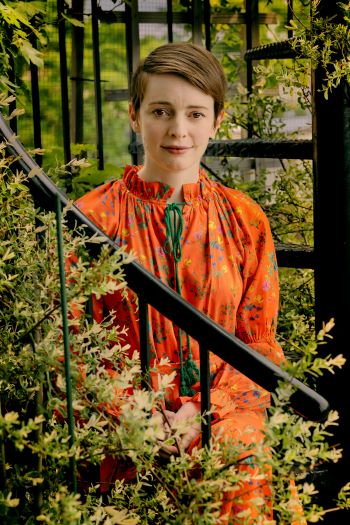Station Eleven & Emily St. John Mandel

THE BOOK: STATION ELEVEN
The post-apocalyptic novel has grown popular enough to warrant its own genre, and one could argue that Station Eleven fits well within that category. Published by Knopf in 2014, it tells the story of a small band of actors and musicians 20 years after a flu pandemic has wiped out 99% of the Earth's population. Like other books in the genre, it highlights the fragility of our existence, our violent nature, and our capacity to survive despite the inevitable hardships of starvation, loneliness, and chaos. But this is where the similarities taper off, for the story Emily St. John Mandel chooses to tell is not one of horror and mayhem that even she admits would befall the survivors in the immediate aftermath of a complete societal collapse. Station Eleven describes a world of hope, of people coping with nostalgia and loss, both in the present and the future, of the power of art and relationships to fulfill us, sustain us, and nurture us back to our best selves.
The novel begins on a snowy night in Toronto during a theater production of Shakespeare's King Lear, where eight-year-old actress Kirsten Raymonde sees the famous Hollywood actor Arthur Leander suddenly struck by a fatal heart attack. This is the same night a super-flu starts to explode like a neutron bomb around the globe, overcrowding hospitals, grounding flights, clogging highways, rendering phone and internet connections useless. Soon there is no electricity, no running water. Within the week, civilization as we know it is wiped out.
From here, the narrative jumps 20 years into the future to a region around the Great Lakes when the worst is over and hints of culture and society are beginning to reemerge amidst a scattering of small settlements of survivors. There are no countries and no borders, and "ferals" still leap out from behind bushes, but there are pockets of tranquility and order. Kirsten is now an adult and part of a nomadic group of classical musicians and actors called the Travelling Symphony that roams the settlements in horse-drawn wagons performing Shakespeare plays, dedicated to keeping art and humanity alive. At each stop, Kirsten scavenges abandoned homes looking through old magazines for mention of Arthur, who—unlike almost everyone and everything else about the old world—is still vivid in her memory. She carries with her a set of graphic novels called Station Eleven that Arthur gave her just before he died.
"I've long been interested in memory as a topic," writes Mandel. "I'm interested in its unreliability ... and in the possibility of memory becoming a burden ... that in a post-apocalyptic scenario, the more you remember, the more you've lost" (Tethered by Letters). To help remind us of the world they lost, the narrative offers flashbacks to the interconnected lives of Arthur and his three wives (Miranda, Elizabeth, and Lydia); Arthur's friend, Clark; Elizabeth and Arthur's son, Tyler; and Jeevan, the paparazzo turned entertainment journalist who gets the exclusive that Arthur is leaving his second wife and son to be with his soon-to-be third wife. Jeevan was also in the audience of the play in which Arthur died, the first night of the pandemic. Mandel had to make a map of the book in Excel to keep track of the multiple storylines, both past and present. "I was constantly reordering the book and moving chapters around" (BookPage).
When the Travelling Symphony returns to a settlement to reunite with a couple and their baby who were once part of the troupe, their lives are threatened by a dangerous prophet and head of a doomsday cult. As the novel moves towards its final climactic scenes, the artists attempt to escape to a settlement in a former major airport, rumored to be a functioning community of 300 people and home to the Museum of Civilization, a collection of old-world artifacts—credit cards, car engines, red stiletto heeled shoes—that survivors had found and preserved.
Station Eleven is ultimately and intentionally a hopeful book, says Mandel. And it's a reminder that art—a play, a comic book, a musical interlude, a museum display, even an apocalyptic novel—can be the best means towards cultivating a civilization and preserving our humanity.
EMILY ST. JOHN MANDEL (photo courtesy of the author; by Sarah Shatz)
Emily St. John Mandel (her middle name, St. John, was her grandmother's surname) was born on Vancouver Island and raised mostly on Denman Island, a small, bucolic island off the coast of British Columbia, Canada. Known for its natural beauty, laid-back feel, and thriving arts community, the island is home to just over 1,000 inhabitants. Mandel's father emigrated from the U.S. and worked on the island as a plumber; her Canadian mother works for an organization that assists victims of domestic violence and is active in the labor movement. Both loved to read and for no reason other than to provide the best education they could, they homeschooled Mandel, encouraging her to write every day.
on Denman Island, a small, bucolic island off the coast of British Columbia, Canada. Known for its natural beauty, laid-back feel, and thriving arts community, the island is home to just over 1,000 inhabitants. Mandel's father emigrated from the U.S. and worked on the island as a plumber; her Canadian mother works for an organization that assists victims of domestic violence and is active in the labor movement. Both loved to read and for no reason other than to provide the best education they could, they homeschooled Mandel, encouraging her to write every day.
"Although I grew up in a very working-class household, there was a tremendous emphasis on books," she told the Columbia Daily Tribune. "We had a lot of books in the house and went to the library all the time... I read voraciously."
Like many teenagers, she also watched television. The island only had two channels, so options were limited, which meant she watched a fair amount of Star Trek: Voyager. It's where she first heard Seven of Nine say "survival is insufficient" in an episode in 1999 — a phrase she wholeheartedly believes and that readers can find on the side of the traveling group's caravan in Station Eleven.
At the age of 18, she left home to study dance at The School of Toronto Dance Theatre and worked with a number of independent choreographers after graduation.
"There was a slow process of going from thinking of myself as a dancer who sometimes wrote, to a writer who sometimes danced, to just thinking of myself as a writer," she told The Rumpus.
While that process was occurring, Mandel moved from Toronto to New York to Montreal and back to New York in less than a year.
"There have been times in my life when I've had to decide to pay the rent or buy groceries," she told Publishers Weekly. "I had a job in Montreal where I had to unload a truck at 7 a.m. in the winter."
Mandel settled in New York and wrote, working part-time as an administrative assistant at a cancer research lab at a university to pay the bills. Her agent found the manuscript for her first novel, Last Night in Montreal (2009), in a slush pile and shopped it around to editors for almost three years before Unbridled Books picked it up. Like many small presses that nurture talented writers overlooked by commercial houses and help them get discovered, Unbridled Books went on to publish two more of her critically acclaimed novels in the genre of literary noir: The Singer's Gun (2010), about a young man trying to remake himself after growing up in a family of criminals, and The Lola Quartet (2012), a jazz-infused mystery about a man searching for an old girlfriend and a daughter who might be his.
In 2014, Mandel published Station Eleven, her fourth novel, with Knopf and her writing career took off at rocket speed. The novel won the Arthur C. Clarke Award, was a finalist for the National Book Award and PEN/Faulkner Award, was an Amazon Best Book of the Month, was named one of the best books of the year by more than a dozen publications, and has been translated into 27 languages. In less than two years, she has participated in more than 125 book tour events in seven countries.
"I was thinking of the way the tour had begun to mirror the book; we traveled endlessly, my fictional characters and I, afraid of violence and sustained by our art, exhausted and exhilarated in equal measure, and the costs were not insignificant but we'd chosen this life," she wrote in an essay for Humanities Magazine about touring during a year when news reports were filled with relentless gun violence. "But every day of the tour ... I met people who cared about life, about civilization, about books, and by the end of the tour this seemed to me to be a reasonable antidote to despair." As is, she will tell you, heading back home to her husband and daughter and office where she writes.
